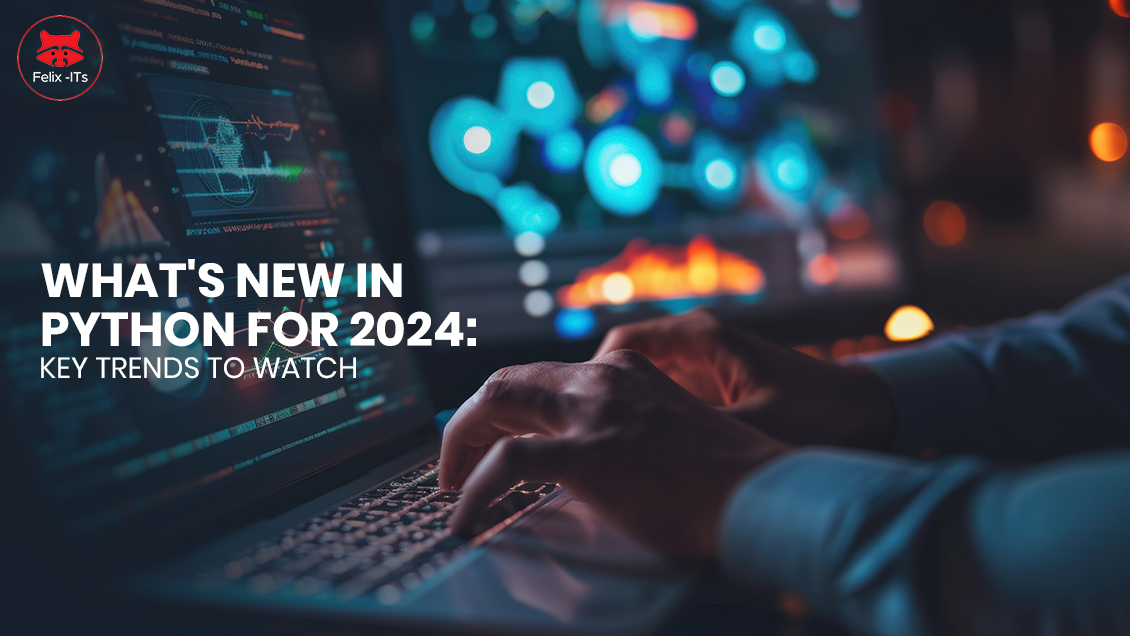In 2024, Python remains pivotal in tech, favored for AI, ML, IoT, games, data viz, NLP, and cloud computing. Its flexibility and robust libraries keep driving innovation, making it essential for developers and businesses to adapt to changing tech trends. In this article, we will discuss the trends running hot in the Python programming language these days and what you can learn from them for a successful career!
Machine Learning and AI
Python leads in machine learning (ML) and artificial intelligence (AI) due to its rich ecosystem. Libraries like TensorFlow and PyTorch provide robust frameworks for building and deploying ML models. Python’s simplicity and readability make it ideal for research, prototyping, and production-level implementations in areas such as natural language processing (NLP), computer vision, and reinforcement learning.
Data Science
Python is a cornerstone of data science with libraries like Pandas for data manipulation, NumPy for numerical computing, and Matplotlib/Seaborn for data visualization. Jupyter Notebooks facilitate interactive data exploration and analysis, enhancing collaboration and reproducibility in research and business analytics.
Web Development
Python excels in web development with frameworks such as Flask and Django. Flask offers flexibility for small-scale applications and APIs, while Django provides a comprehensive framework for scalable web projects. FastAPI, leveraging Python’s async capabilities, is gaining popularity for high-performance APIs, making Python a versatile choice for web developers.
Automation
Python’s simplicity and extensive standard library make it a go-to language for automation tasks. From scripting repetitive tasks to orchestrating complex workflows, Python’s readability and broad community support ensure efficient automation across various domains, including system administration, testing, and data processing pipelines.
Blockchain
Python is pivotal in blockchain development, powering smart contracts and decentralized applications (dApps) through frameworks like Web3.py for Ethereum. Its ease of use, combined with libraries for cryptography and networking, makes Python a preferred choice for blockchain developers seeking to create secure and efficient decentralized solutions.
IoT
Python’s lightweight footprint and extensive libraries like MQTT and Adafruit make it well-suited for IoT applications. From sensor data processing to device management and IoT gateway integration, Python simplifies development across the IoT ecosystem, enabling rapid prototyping and deployment of connected devices and systems.
Serverless Computing
Python’s integration with serverless platforms like AWS Lambda and Google Cloud Functions streamlines the development and deployment of serverless applications. Its scalability, combined with event-driven architecture, supports microservices, data processing pipelines, and backend functions without managing infrastructure, making Python a preferred language for serverless computing environments.
DevOps
Python’s scripting capabilities and libraries such as Fabric and Ansible automate deployment, configuration management, and orchestration tasks in DevOps workflows. From provisioning infrastructure to continuous integration and deployment (CI/CD), Python empowers DevOps teams to streamline processes, improve efficiency, and maintain scalability in modern software development practices.
Ethical Hacking and Cybersecurity
Python’s versatility and robust libraries like Scapy for packet manipulation and PyCrypto for cryptography support ethical hacking, penetration testing, and cybersecurity operations. Python’s readability and extensive community-contributed libraries make it indispensable for security professionals conducting vulnerability assessments, network scanning, and incident response in cybersecurity domains.
Quantitative Finance
Python is a dominant force in quantitative finance, offering libraries like QuantLib for financial modeling, pandas-datareader for fetching financial data, and NumPy for numerical computations. Its versatility in algorithmic trading, risk management, and financial analytics makes Python the language of choice for finance professionals, enabling sophisticated analysis and decision-making in volatile and complex financial markets.
Key Skills to Learn as a Python Developer
As a Python developer, mastering several key skills can significantly enhance your effectiveness and versatility:
Core Python: Understanding fundamental concepts like data structures, loops, and functions is essential. This forms the foundation for advanced programming.
Object-Oriented Programming (OOP): Learn how to structure code using classes, objects, inheritance, and polymorphism. OOP facilitates modular and scalable software development.
Web Frameworks: Familiarize yourself with frameworks like Django or Flask for web development. These frameworks streamline backend development and encourage best practices.
Data Science Libraries: Explore libraries such as NumPy, Pandas, and Matplotlib for data manipulation, analysis, and visualization. These are crucial for data-driven applications.
Databases and SQL: Gain proficiency in database management systems (DBMS) and SQL for interacting with databases. Understand ORM (Object-Relational Mapping) tools like SQLAlchemy.
Version Control: Learn Git for managing code versions, collaboration, and project management. It’s indispensable in professional environments.
Testing: Familiarity with testing frameworks like unittest or pytest ensures your code is robust and reliable.
Deployment: Understand deployment tools like Docker and platforms like AWS or Heroku for deploying and scaling applications.
Algorithm and Data Structures: Enhance problem-solving skills with algorithms and data structures. This knowledge is critical for optimizing code performance.
Continuous Learning: Stay updated with Python’s latest trends, libraries, and best practices through communities, forums, and online courses.
Mastering these skills empowers you to tackle diverse projects, from web development and data science to automation and backend services, making you a well-rounded Python developer.
Final Thoughts
Python’s versatility, strength, and broad use across different fields highlight its role as a top programming language in today’s tech world.
Learning Python is advantageous for students, and Felix-IT Systems offers a specialized course to master it. Their industry-aligned curriculum ensures students gain practical skills. After completing the course, Felix-IT Systems provides placement support, helping students secure jobs in the tech industry. It’s a great opportunity for aspiring programmers to learn a versatile language like Python and kickstart their careers with professional guidance and support.


